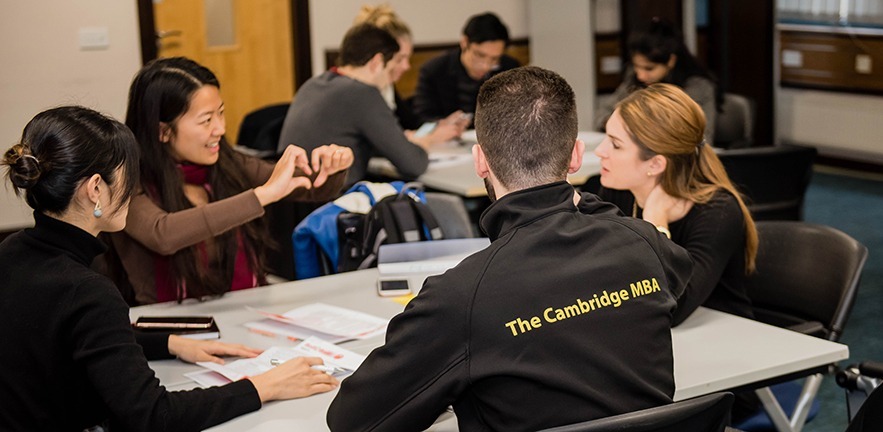The Cambridge MBA can claim a unique approach to teaching the “doing” of management with its Management Praxis course. Faculty and candidates explain why.


Cambridge places a unique value on Management Praxis (MP) on the MBA programme. The intensive focus is a measure of the importance of the subject says Dr Matthew Jones, one of Cambridge Judge Business School’s faculty who teach the course:
“Management Praxis is about the ‘doing’ of management and provides an opportunity for students to develop more flexible, self-aware and skilful practice related to their personal business and management objectives. This deep emphasis on the practice, as well as the theory, of management is a distinctive feature of the Cambridge MBA.”
The Cambridge Venture Project (CVP)
In order to achieve this blending of theory and practice, Management Praxis runs in parallel with a live project working with a local company. This Cambridge Venture Project (CVP) offers a safe environment in which students can try out ideas from the Management Praxis course, enabling them to reflect on and experiment with different ways of being a manager and a team member.
“Management Praxis cannot simply be taught in the classroom” says Matthew. “The CVP was therefore designed, from the very start of the Cambridge MBA, as a ‘laboratory’ for the Management Praxis course. We encourage students to keep a diary of their CVP experience as a basis for reflecting on their learning.”
The course seeks to equip candidates with vital skills that will stand them in good stead over the entire arc of their career, as Matthew comments:
“One of the long-standing criticisms of MBA programmes is that they focus almost exclusively on technical skills. MBA graduates can therefore know a lot about how to manage in theory, but have little practical experience. The Management Praxis course, with its ‘boots on the ground’ Cambridge Venture Project component, addresses this gap and enables students to apply the technical skills they learn more effectively. Alumni tell us that the benefit of what they learned on the course stays with them as they progress through their careers.”
Students have a second chance to apply their learning from the Management Praxis course in the Global Consulting Project (GCP) and this is no coincidence as the GCP is a summation of everything taught in Management Praxis and allows candidates to try out, on a real-world project, everything they have learnt during the Management Praxis course. The skills of cross-cultural communication, collective problem solving, building productive relationships and conflict resolution – all taught on the MP course – are all put into practice during the GCP.
The learning takeaways
MBA candidate William Tipping-Woods found the experience of the MP course “completely invaluable. I would never be able to push myself so far in such a short space of time in a professional work environment”. Two important questions the course answered for him were around how people build (and lose) trust – “you learn this incredibly efficiently through some of the group exercises” – and how to deal with colleagues who are too much like you, or very different from you, to get things done quickly. William added:
“In the professional world, relationships are everything. The technical skills of the MBA, you could probably learn in isolation if you really needed to, but management praxis gives you the opportunity to test who you are, how you interact and respond in challenging situations, and allows you to try new things to figure out exactly what kind of leader you want to be.”
William’s CVP involved delivering a growth strategy for a client in an industry that was new to all of the project group. The learning they had absorbed from the MP course helped him both as part of the group and individually:
“In terms of the group dynamic, we were able to cut through the superficial and unproductive politeness of the group and become a strong productive and respectful team. The MP workshops, small group sessions and CVP all helped me personally overcome my conflict aversion and allowed me to test the boundaries of what productive conflict is. The MP course accelerated my development in this area dramatically.”
Alison Wycinowski found the Management Praxis course a great opportunity to explore theories and test them in the CVP teams:
“I particularly enjoyed the lively debates that ensued from some of the topics covered. Our stream is filled with individuals from various backgrounds and the different perspectives bring a lot of colour and context to the content and often the contrarian opinions. I also enjoyed the competitive games that forced us to communicate and work effectively in teams during constrained timescales. I found a great deal of value in everything we learnt – especially about effective management and global team styles.”
Phil Holbrook had stepped out of a “long company background” when he started the MBA and is interested in “discovering more about my own strengths and weaknesses and how they are interpreted by others. This course has provided a framework and provided a context that has given me insight and conviction”. Phil’s goal post-MBA is to move into entrepreneurship – probably innovation in financial services. “As my CVP focused on financial innovation by using distributed ledger technology I had the opportunity to apply MP in a relevant practical context, something which should be immensely valuable in the future.”
Dr Matthew Jones and faculty colleagues, Dr Keith Goodall and Dr Helen Haugh, work hard to make the Management Praxis course a vital learning experience for anyone, whether they aim to climb the corporate ladder or venture into entrepreneurship. Whatever industry or role candidates move into post-MBA, the Management Praxis course has an especially valuable lesson to impart on the uses of power:
“The MP element encourages you to ask for help and feel part of a wider team, to refer to those around you and ensure you don’t tackle problems and issues in isolation. It teaches you to be aware of your power as you take on more responsibilities in your career, and how to use the power you accrue sensibly to meet an overall goal instead of as a simple assertion of power and nothing more. This is a very important lesson for those aiming to climb higher up the corporate ladder.”
The teaching team does not rest on its laurels and keeps the course constantly under review. Matthew adds:
“We are continuously reviewing and revisiting the takeaways of both the MP course and the CVP. This review process is always ongoing in the context of new information, learning and ideas emerging from the discipline of Management Praxis, and we refine the course accordingly. Applicants to the MBA often tell us that they chose Cambridge because of its practical focus and that they value the opportunity to apply their learning in the various MBA projects. We take seriously our commitment to giving them the best course possible to help them become successful and effective managers.”

